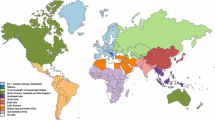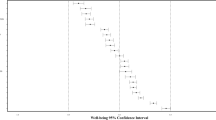Abstract
The paper uses qualitative and quantitative data collected by the Wellbeing in Developing Countries ESRC research group in Bangladesh and Thailand to explore the extent to which objective need deprivation predicts subjective and psychological wellbeing, controlling for location, socio-economic status, and gender. The regression analysis is triangulated with qualitative analysis of three illustrative case studies to explore why people experiencing great need deprivation nevertheless report high subjective and psychological wellbeing and propose factors that might support their resilience. The paper reports perhaps unsurprisingly that need deprivation was lower in Thailand than Bangladesh, and subjective and psychological wellbeing higher, with the exception of life satisfaction which was higher in Bangladesh. While goal attainment was significantly associated with affect and life satisfaction in both countries, in Thailand life satisfaction and goal attainment were negatively correlated (−.334), so the more goals respondents felt they had attained, the less satisfied they were. These apparent anomalies are explored further using data from the case studies. The findings confirm that although measures of subjective and psychological wellbeing are correlated, they are not substitutable. For example, subjective wellbeing, especially positive affect, is more influenced by need deprivation than psychological wellbeing, while psychological wellbeing is more influenced by demographic factors, especially in Thailand. Finally, the paper discusses whether the distinct relationships of subjective and psychological wellbeing with need deprivation and income have any implications for policymakers.
Similar content being viewed by others
Notes
Socio-economic status was controlled for in case the INDI was partially capturing the effect of wealth as well as intermediate needs. This proved to be the case as when regressions were run without the asset variable the INDI variable was not significant in Thailand and was only significant in Bangladesh in relation to positive affect and attainment of valued goals.
To preserve anonymity people and communities have been given pseudonyms.
References
Ahuvia, A. C., & Friedman, D. (1998). Income, consumption, and subjective well-being: Toward a composite macro-marketing model. Journal of Macromarketing, 18, 153–168.
Biswas-Diener, R., & Diener, E. (2001). Making the best of a bad situation: Satisfaction in the slums of Calcutta. Social Indicators Research, 55, 329–352.
Biswas-Diener, R., & Diener, E. (2006). The subjective well-being of the homeless, and lessons for happiness. Social Indicators Research, 762, 185–205.
Brinkerhoff, M. B., Fredell, K. A., & Frideres, J. S. (1997). Basic minimum needs, quality of life and selected correlates: Explorations in villages in northern India. Social Indicators Research, 42, 245–281.
Camfield, L. (2008). Universal coverage but unequal access? Factors affecting the use of health services in Northeast and South Thailand. In V. Moller & D. Huschka (Eds.), Quality of life and the millennium challenge: Advances in quality-of-life studies, theory and research (Social Indicators Research series) (pp. 239–264). The Netherlands: Springer.
Camfield, L., Choudhury, K., & Devine, J. (2007). Well-being, happiness and why relationships matter: Evidence from Bangladesh. Journal of Happiness Studies, 10, 71–91.
Christopher, J. C. (1999). Situating psychological wellbeing: Exploring the cultural roots of its theory and research. Journal of Counseling & Development, 77, 141–152.
Clark, D. A. (2007). Adaptation, poverty and well-being: Some issues and observations with special reference to the capability approach and development studies. GPRG-WPS-081.
Clarke, M. (2006). Assessing well-being using hierarchical needs. In M. McGillivray & M. Clarke (Eds.), Understanding human well-being (pp. 217–238). India: United Nations University Press.
Copestake, J., & Camfield, L. (2009). Measuring subjective wellbeing using a personal life goals satisfaction approach. WeD working paper series, WeD 09/45.
Cummins, R. A. (2005). Caregivers as managers of subjective wellbeing: A homeostatic perspective. Journal of Applied Research in Intellectual Disabilities, 18(4), 335–344.
Diener, E. (1984). Subjective well-being. Psychological Bulletin, 95, 542–575.
Diener, E., Diener, M., & Diener, C. (1995). Factors predicting the subjective well-being of nations. Journal of Personality and Social Psychology, 69, 851–864.
Diener, E., Emmons, R., Larsen, R., & Griffin, S. (1985). The satisfaction with life scale. Journal of Personality Assessment, 47, 1105–1117.
Diener, E., & Lucas, R. E. (2000). Explaining differences in societal levels of happiness: Relative standards, need fulfilment, culture, and evaluation theory. Journal of Happiness Studies, 1, 41–78.
Diener, E., Suh, E. M., Lucas, R. E., & Smith, H. E. (1999). Subjective well-being: Three decades of progress. Psychological Bulletin, 125, 276–302.
Doyal, L., & Gough, I. (1991). A theory of human need. London: Macmillan.
Drakopoulos, S. (2008). The paradox of happiness: Towards an alternative explanation. Journal of Happiness Studies, 9, 303–315.
Easterlin, R. (2003). Explaining happiness. Proceedings of the National Academy of Sciences, 100, 11176–11183.
Fafchamps, M., & Shilpi, F. (2008). Subjective welfare, isolation, and relative consumption. Journal of Development Economics, 86, 43–60.
Frey, B. S., & Stutzer, A. (2002). What can economists learn from happiness research? Journal of Economic Literature, 40, 402–435.
Gough, I., McGregor, J. A., & Camfield, L. (2007). Introduction: Conceiving wellbeing in development contexts. In I. Gough & J. A. McGregor (Eds.), Wellbeing in developing countries: New approaches and research strategies. Cambridge: Cambridge University Press.
Graham, C., & Felton, A. (2006). Inequality and happiness: Insights from Latin America. Journal of Economic Inequality, 4, 107–122.
Graham, C., & Pettinato, S. (2002). Happiness and hardship: Opportunity and insecurity in new market economies. Washington, DC: Brookings Institution Press.
Guillen-Royo, M., & Velazco J. (2005). Exploring the relationship between happiness, objective and subjective wellbeing: Evidence from rural Thailand. Paper presented at the capabilities and happiness conference 16–18 June 2005.
Guillen-Royo, M. (2009). Adequacy of life domains and relative consumption in Peru. Journal of Economic Psychology (submitted).
Guillen-Royo, M., Velazco, J., & Camfield, L. (2009). Basic needs and happiness in Thailand: Exploring the linkages between objective and subjective wellbeing. In C. Brassard & T. Kusago (Eds.), Development paths and happiness: Alternative frameworks in Asia. Routledge (in press).
Jackson, T., & Marks, N. (1999). Consumption, sustainable welfare and human needs—with reference to UK expenditure patterns 1954–1994. Ecological Economics, 28, 421–442.
Jongudomkarn, D., & Camfield, L. (2006). Exploring the quality of life of people in North Eastern and Southern Thailand. Social Indicators Research, 78, 489–530.
Kasser, T., & Ryan, R. M. (1993). A dark side of the American dream: Correlates of financial success as a central life aspiration. Journal of Personality and Social Psychology, 65, 410–422.
Lewis, D., & McGregor, J. A. (1992). Change and impoverishment in Albania, Mimeo. Bath: Centre for Development Studies, University of Bath.
Lyubomirsky, S., King, L. A., & Diener, E. (2005a). The benefits of frequent positive affect: Does happiness lead to success? Psychological Bulletin, 131, 803–855.
Lyubomirsky, S., Sheldon, K. M., & Schkade, D. (2005b). Pursuing happiness: The architecture of sustainable change. Review of General Psychology, 9, 111–131.
Maslow, A. (1943). A theory of human motivation. Psychological Review, 50, 370–396.
Max-Neef, M., Elizalde, A., & Hopenhayn, M. (1987). Human scale development: Conception, application and further reflections. New York: Apex Press.
McGregor, J. A. (2007). Researching wellbeing: From concepts to methodology. In I. Gough & J. A. McGregor (Eds.), Wellbeing in developing countries: New approaches and research strategies. Cambridge: Cambridge University Press.
McGregor, J. A., Camfield, L., Masae, A., & Promphaking, B. (2008). Wellbeing, development and social change in Thailand. Thammasat Economic Journal, 26, 1–27.
McGregor, J. A., McKay, A., & Velazco, J. (2007). Needs and resources in the investigation of well-being in developing countries: Illustrative evidence from Bangladesh and Peru. Journal of Economic Methodology, 14, 107–131.
NESDB. (1997). Wellbeing measurement and policy analysis. Bangkok: National Economic and Social Development Board.
Reader, S. (2006). Does a basic needs approach need capabilities? Journal of Political Philosophy, 14, 337–350.
Rojas, M. (2005). A conceptual-referent theory of happiness: Heterogeneity and its consequences. Social Indicators Research, 742, 261–294.
Ryan, R. M., & Deci, E. L. (2000). Self-determination theory and the facilitation of intrinsic motivation, social development, and well-being. The American Psychologist, 55, 68–78.
Ryff, C. D., & Singer, B. (2006). Best evidence yet for the six-factor model of psychological well-being. Social Science Research, 35, 1103–1119.
Sapyta, J. (1997). Conceptions of well-being in independent and interdependent cultures: Shall the twain ever meet? BS thesis, Urbana-Champaign: University of Illinois.
Schwarz, N., & Strack, F. (1999). Reports of subjective well-being: Judgmental processes and their methodological implications. In D. Kahneman, E. Diener, & N. Schwarz (Eds.), Well-being: The foundations of hedonic psychology (pp. 61–84). New York: Russell Sage Foundation.
Schyns, P. (2001). Income and satisfaction in Russia. Journal of Happiness Studies, 2, 173–204.
Sen, A. (1987). On ethics and economics. Oxford: Basil Blackwell.
Sheldon, K. M., Elliot, A. J., Kim, Y., & Kasser, T. (2001). What’s satisfying about satisfying events? Comparing ten candidate psychological needs. Journal of Personality and Social Psychology, 80, 325–339.
Sheldon, K. M., Ryan, R., Deci, E., & Kasser, T. (2004). The independent effects of goal contents and motives on well-being: It’s both what you pursue and why you pursue it. Personality and Social Psychology Bulletin, 30, 475–486.
Staudinger, U. M., Fleeson, W., & Baltes, P. B. (1999). Predictors of subjective physical health and global well-being: Similarities and differences between the United States and Germany. Journal of Personality and Social Psychology, 76, 305–319.
Suh, E. M. (2000). Self; the hyphen between culture and subjective well-being. In E. Diener & E. M. Suh (Eds.), Culture and subjective well-being (pp. 185–218). Cambridge, MA: MIT Press.
Veenhoven, R. (1991). Is happiness relative? Social Indicators Research, 24, 1–34.
Watson, D., Tellegen, A., & Clark, L. (1988). Development and validation of brief measures of positive and negative affect: The PANAS scales. Journal of Personality and Social Psychology, 54, 1063–1070.
Woodcock, A. (2007). Validation of the WeDQoL-Goals-Bangladesh: Goal necessity and satisfaction scales and individualised quality of life scores: Report to the WeD team. Bath: Wellbeing in Developing Countries Research Group, University of Bath.
Woodcock, A., Camfield, L., McGregor, J. A., & Martin, F. (2008). Validation of the WeDQoL-Goals-Thailand measure: Culture-specific individualised quality of life. Social Indicators Research (in press). doi:10.1007/s11205-008-9357-x.
Acknowledgments
The data analysed in this paper was collected by the UK Economic and Social Research Council research group on Wellbeing in Developing Countries (WeD, www.well-dev.org.uk) as part of its exploration of the social and cultural construction of wellbeing in Thailand and Bangladesh. The authors would like to thank our collaborators in Prince of Songkhla and Khon Kaen Universities, Proshika, BIDS, and IDDRB. The support of the Economic and Social Research Council is gratefully acknowledged.
Author information
Authors and Affiliations
Corresponding author
Rights and permissions
About this article
Cite this article
Camfield, L., Guillen-Royo, M. & Velazco, J. Does Needs Satisfaction Matter for Psychological and Subjective Wellbeing in Developing Countries: A Mixed-Methods Illustration from Bangladesh and Thailand. J Happiness Stud 11, 497–516 (2010). https://doi.org/10.1007/s10902-009-9154-5
Published:
Issue Date:
DOI: https://doi.org/10.1007/s10902-009-9154-5




